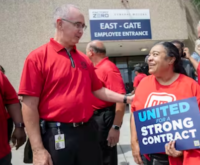By STEPHEN SINGER
AP Business Writer
HARTFORD, Conn. (AP) _ A low-cost state loan to train manufacturing workers is drawing support from business groups that say Connecticut is ill-prepared for an increase in aerospace and other high-tech factory work, but some economists are dismissing the complaint as overblown.
Last week, Gov. Dannel P. Malloy announced a 10-year $711,533 loan at 2 percent interest to help TOMZ Corp., a Berlin machining company, expand and build a training center. Principal and interest will be deferred for two years, and TOMZ will be eligible to be forgiven for $350,000 of the loan if it meets job targets.
As part of the $2.3 million project, TOMZ will increase its production to meet growing demand and add 30 jobs to its workforce of 123 employees. The company manufactures parts for medical devices and health care, laboratory diagnostic and aerospace companies.
Malloy said aerospace manufacturers such as Hartford’s United Technologies Corp., The Boeing Co. and Airbus expect an increase in production in the next few years and Connecticut’s network of aerospace supply companies must be prepared to meet the demand. He said the state is acting to counter a shortage of skilled manufacturing workers.
A $30 million manufacturing fund was enacted this year to help companies modernize and grow, buy equipment, develop technologies and provide access to training and specialized education for workers.
“We are providing leading manufacturers, like TOMZ, with the support they need to expand, increase production and create good-paying jobs with good benefits to counter the shortage of skilled workers in this industry,” the governor said.
Connecticut is more dependent on manufacturing jobs than the rest of the United States. As of June, 163,000 manufacturing jobs in Connecticut represented nearly 10 percent of total employment, the state Department of Labor said. In contrast, manufacturing jobs nationwide accounted for 8.7 percent of employment.
But economists aren’t convinced that Connecticut faces a widespread shortage of skilled manufacturing workers.
“Is it a broad-based, pervasive problem in the manufacturing sector? No,” said Paul Osterman, a professor at the Sloan School of Management at the Massachusetts Institute of Technology.
Osterman said companies that once trained workers are now shifting the work to government. If particular firms are complaining they have too few workers, those companies may be to blame, he said.
“It’s easy for firms to say they can’t find anyone when they don’t raise wages or pay for training,” he said.
Peter Gioia, an economist for the Connecticut Business and Industry Association, said rising demand for aerospace is stoking state economic development efforts to train more workers.
“They could multiply their effort by five and still not meet demand,” he said.
In response to rising demand, training programs have been established at community colleges in the past few years for prospective workers, said Judith K. Resnick, executive director of the Connecticut Business and Industry Association’s Education Foundation.
“We will not have enough able-bodied people to take these jobs,” she said.
The industry faces two big problems: not enough workers or not the right kind of workers, Resnick said.
The state Department of Economic and Community Development doesn’t have data showing manufacturers are hurting for trained workers, spokesman Dave Treadwell said. But employers have told Commissioner Catherine Smith they need qualified employees.
“She’s hearing from the businesses and they’re saying it is a problem,” Treadwell said. “It doesn’t necessarily matter what the economists are saying.”
___
Follow Stephen Singer on Twitter at https://twitter.com/SteveSinger10









